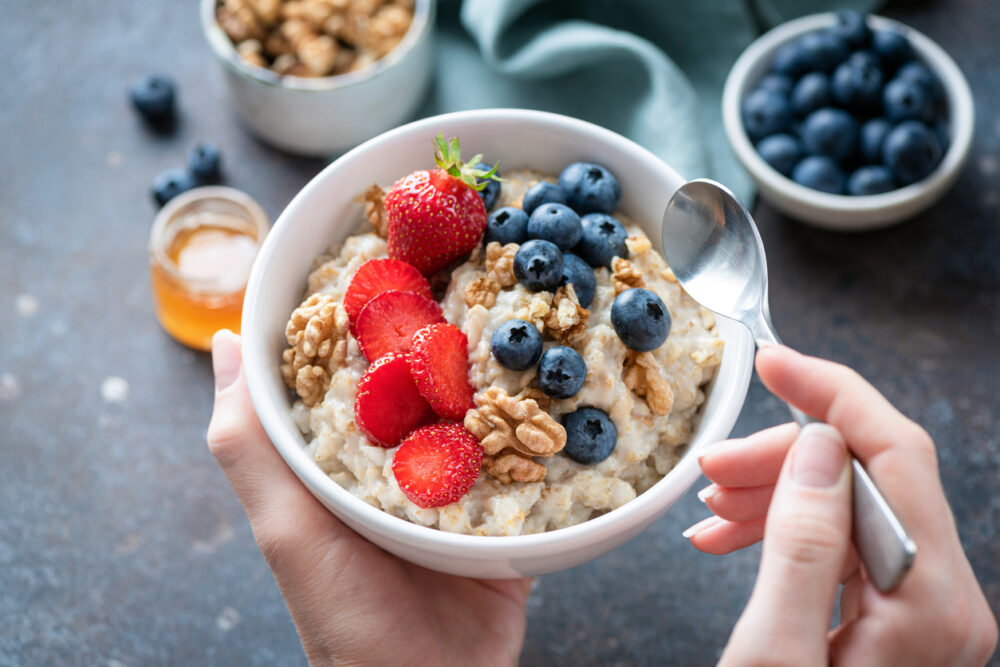How you start your morning shapes every bite that follows.

Rushed breakfasts, mindless snacking, and eating on autopilot can leave you feeling disconnected from your food. But when you begin the day with intention, it changes how you eat for the rest of the day. Mindful eating isn’t about dieting or rules—it’s about being present, savoring flavors, and actually enjoying your meals. And it all begins in the morning.
These breakfast rituals help you bring mindfulness into your first meal of the day. By creating space for awareness, gratitude, and sensory connection, you naturally become more conscious of what and how you eat. Whether it’s through small shifts in your routine or the way you experience food, these habits will transform breakfast into a nourishing ritual that influences every meal after it.
1. Wake up with a full glass of water.

Before diving into breakfast, hydrating first thing in the morning wakes up your body and prepares it for mindful nourishment. After hours of sleep, your body craves water, not caffeine or sugar.
Amy Richter at Medical News Today reports that drinking water first thing in the morning can boost energy levels and improve mental performance, as even mild dehydration can impair concentration, mood, and memory. Rather than chugging it mindlessly, take slow sips and notice the sensation of the water replenishing you. Drinking water before eating also makes it easier to distinguish between thirst and hunger, helping you choose food based on actual need rather than habit. This simple ritual clears your mind and body, making it easier to approach breakfast with awareness.
2. Create a calm, distraction-free breakfast space.

If your morning meal happens in front of a screen, in the car, or while standing at the counter, you’re missing the full experience of eating. Turning breakfast into a mindful ritual starts with where you eat. Harvard’s T.H. Chan School of Public Health notes that eating without distractions enhances the experience, helping you fully engage your senses and enjoy your food.
Clearing a space, even if it’s just a clean corner of your kitchen, signals to your brain that it’s time to focus. A soft light, gentle music, or a deep breath before eating can set a peaceful tone. Making your eating environment intentional—even for just five minutes—turns breakfast from a rushed task into a moment of care.
3. Breathe before your first bite.

Most people dive straight into breakfast without thinking. A simple pause before eating—just one deep breath—creates a shift into a more present state. According to Lauren Manaker at Verywell Health, deep breathing before a meal stimulates the vagus nerve, which regulates muscle contraction and secretion of gastric acid and digestive enzymes, thereby aiding digestion. It also lowers stress, which can improve how your body processes nutrients and regulates appetite.
This small act of mindfulness builds a stronger connection between your body and your meal, making you less likely to eat out of habit or stress. Instead of automatically moving from plate to mouth, you bring awareness to your meal.
This shift enhances flavors, increases satisfaction, and helps you recognize when you’re full. With just a few extra seconds of mindfulness, breakfast becomes an intentional act instead of something rushed through without thought.
4. Start with a warm drink that soothes your senses.

Coffee might be the go-to morning beverage, but choosing a warm drink that encourages mindfulness can elevate your breakfast experience. Herbal tea, lemon water, or a slow-sipped latte helps you wake up gently rather than shocking your system into high alert. Holding a warm cup in your hands, inhaling the steam, and taking slow sips allows you to ease into the day rather than rushing into stimulation.
Quiet stillness before eating signals to your body that nourishment is coming, awakening digestion without the jolt of processed sugar or caffeine overload. Engaging your senses before eating prepares you to be more present with your food, turning breakfast into something you fully experience rather than something you rush through. Rituals like this set the tone for more mindful eating throughout the day.
5. Choose whole foods with natural flavors.

Mindful eating starts with food that actually tastes like real food. Overly processed foods can dull your body’s natural hunger and fullness cues, making it harder to eat intuitively throughout the day. Breakfast that includes whole, minimally processed ingredients—like fresh fruit, nuts, oats, eggs, and whole grains—allows you to fully experience natural sweetness, crunch, and richness without artificial distractions.
Filling your plate with nutrient-dense, flavorful foods doesn’t just support better digestion—it also sets your taste preferences for the rest of the day. When you nourish yourself with real, satisfying ingredients in the morning, you’re more likely to crave balanced, whole foods instead of chasing sugar spikes and crashes.
6. Engage all five senses while you eat.

Conscious eating isn’t just about what you eat—it’s about how you experience it. Engaging all five senses transforms breakfast from a routine habit into an immersive act of presence. Notice the colors and textures of your food before taking a bite.
Breathe in the aroma of warm toast, fresh fruit, or brewed coffee. As you chew, focus on the different layers of flavor, the temperature, and the way the textures change.
Fully engaging with your food as you eat increases satisfaction, prevents overeating, and makes each bite more enjoyable. This simple practice strengthens your connection to your hunger and fullness cues, keeping you more attuned to what your body actually needs.
7. Eat slowly, chew fully, and put your utensils down between bites.

The faster you eat, the harder it is for your body to recognize when it’s full. Rushing through meals often leads to overeating because your brain doesn’t have enough time to register satiety. Slowing down allows your body to properly process food, making each bite more enjoyable and giving your digestive system the time it needs to do its job.
A simple way to pace yourself is by putting your utensils down between bites. Taking a brief pause prevents mindless eating and lets you fully experience each flavor. Chewing thoroughly also improves digestion and nutrient absorption. When you eat with more intention, meals become more satisfying, and you naturally feel full without needing to overeat. Mindful eating isn’t about restriction—it’s about experiencing food in a way that nourishes both your body and your senses.
8. Express gratitude for your meal.

A moment of appreciation before eating shifts your mindset from autopilot to awareness. Recognizing the effort that went into your meal—the farmers, the earth, the hands that prepared it—creates a deeper connection to what’s on your plate.
Gratitude naturally slows you down, helping you become more present and engaged with your meal. Taking a pause before your first bite can reinforce mindfulness and intention. Some people choose to express gratitude silently, while others take a deep breath or reflect for a few seconds. However you approach it, taking time to acknowledge your food enhances the eating experience and helps carry mindfulness into the rest of your meals throughout the day.
9. Listen to your body, not the clock.

Hunger doesn’t follow a rigid schedule, yet many people eat based on time rather than their body’s actual needs. Appetite fluctuates depending on sleep, activity levels, and stress, so forcing yourself to eat at a set time can lead to unnecessary consumption or ignoring genuine hunger.
Before reaching for food, pay attention to how your body actually feels. Some mornings, a full meal feels necessary; other times, something lighter is enough. Being flexible with your eating habits prevents mindless snacking and helps you avoid energy crashes later. The more you trust your body’s cues instead of following the clock, the easier it becomes to eat in a way that truly satisfies and sustains you.
10. Stop multitasking while you eat.

The majority of Americans treat breakfast as a background activity, eating while checking emails, scrolling social media, or planning the day ahead. When attention is divided, it’s easy to eat quickly, overeat, or finish a meal without even noticing the flavors. Mindful eating starts with making food the priority, even if only for a few minutes.
Put your phone down and turn your attention to the food in front of you. Giving yourself a few uninterrupted minutes to eat allows you to experience the taste, texture, and satisfaction of each bite. If mornings are hectic, even a small moment of distraction-free eating can make a difference.
Turning breakfast into a single-task experience improves digestion, increases meal satisfaction, and strengthens your ability to eat intuitively. The more present you are with your food, the more nourishing and enjoyable your meals become throughout the day.
11. End with a moment of stillness.

The transition from breakfast into the rest of the day often happens too quickly. Many people finish their last bite and immediately rush into tasks, missing the opportunity to acknowledge the meal they just had. Taking a few moments of stillness after eating helps your body register that the meal is complete and prepares your mind for what’s next.
This can be as simple as sitting for 30 extra seconds, taking a few deep breaths, or just noticing how your body feels after eating. These small pauses prevent the mind from jumping straight into the next activity, allowing you to leave breakfast feeling calm and intentional. Starting the day with this quiet moment makes it easier to carry mindfulness through lunch, dinner, and every meal in between.